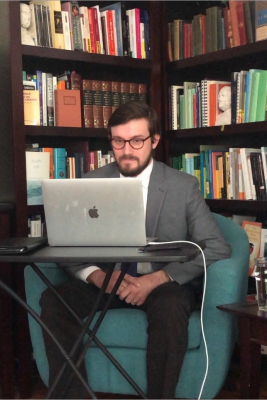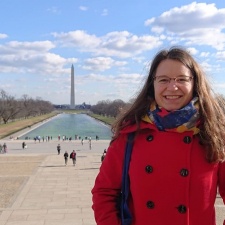Melissa Baroff
"This year, I completed my coursework and preliminary exams. I presented at the SCS on gender and visuality in Aeschylus’ Agamemnon. I also presented on the “mulier dolosa” and “libertus” in Horace’s Satires 2.5. I am now working on my dissertation prospectus, which will focus on the characterization of Nero’s wives."
Erickson Bridges
"My fifth year in the graduate program has been just as unique as I imagine everyone else’s has, given the times we have found ourselves in this past year. As I continued working on my dissertation on Lucretius, I made the transition to teaching a fully online section of Latin 101 last fall. While the circumstances were admittedly a bit unfamiliar, I successfully converted my previous teaching plans to the virtual space and did my best to recreate the feeling of the in‐person classroom experience via Zoom. Also during last fall, I passed my virtual first chapter defense and have since continued working on my dissertation, which I recently finished the second chapter of.
"This fall, I will be teaching an in‐person section of Latin 203, which I am very much looking forward to; I’ve greatly missed the joys of teaching students in the classroom. Further, I am grateful to have received the Bass Instructional Fellowship for this academic year: I will be an Instructor of Record, teaching an introductory course on Epicurean philosophy to Duke students this spring. I am extremely excited to be teaching this course: Epicureanism philosophy is one of my primary academic interests, and to be given the opportunity to teach an undergraduate course of my own design is simply wonderful."
Alexander Karsten
"My fifth year as a graduate student was one I will never forget. With the unwavering support of Dr. González, I’ve made considerable progress on my dissertation and presented papers at the SCS and a specialized conference (“Rethinking the Classics” in Coimbra). Antonio LoPiano and I co‐designed a Greek Civilization course and each taught our own sections—my first lecture course. A summer fellowship gave me the opportunity to help design our department’s mentorship program. Perhaps proudest of all, I served as a founding member of the IDEA (Inclusion, Diversity, Equity, and Anti‐racism) committee. The department‐wide work already invested in this committee has been truly inspiring.
"But what made the past year so memorable wasn’t what happened, but how it happened: conducting research without setting foot in the stacks, giving conference papers and lectures from my living room, meeting with professors and attending talks on my porch. I doubt I will remember specific goals I reached this year, but I know I’ll remember how our department showed that, through it all, we are here for each other. I’ve been awed by the creativity, the compassion, and the strength of our community. The past year has been difficult, but I’ve never been more optimistic about the future of Duke Classics."
Clinton Kinkade
"My sixth year here at Duke was a productive one. After a slight reworking of the chapters in my dissertation (covering the ancient reception of Sophocles in his scholia and biography), I have completed the final chapter this summer. Since then, I have been polishing these completed chapters and working on the introduction and conclusion. The long and continued quarantine has been both a blessing and a curse for my writing. During the school year, I got to teach Introductory Greek once more. The pandemic made for a slightly strange classroom; one student was virtual all year, and our classroom was rather cavernous for just the six of us. But they were an excellent bunch, and it was lovely to teach Greek again.. This summer I have been working with the Graduate Liberal Studies department, helping them navigate potential changes the department could make to adapt to their changing student population. For this fall, I received a Bass Fellowship to co-teach Roman Drama along with Professor Ginsberg. In addition to my Classics work, I was also happy in August to celebrate the 95th birthday of my grandmother together with."
Sinja Küppers
"The Society of Classical Studies in Washington D.C. 2020 was my last in person conference. In 2021, I presented a paper on how Second Sophistic authors appropriated the chair (thronos) in the Roman Empire. Being an international student in a pandemic held some challenges in the last academic year but also informed my research. At the CAMWS Redux conference, I presented a paper on Studying 'Abroad' in Antiquity: Student Movement and Educational Policy, which received the Presidential Award for Outstanding Graduate Student Paper 2021. As a Preparing Future Faculty fellow I had the opportunity to virtually visit colleges and universities around Duke, connect with a faculty mentor and teach an online session on Girls' education in Early Christianity at Elon University. In addition, I enjoyed designing an archival expeditions module on the Textual Transmission of Female Greek Lyric Poets for Prof. Erika Weiberg's class on Hellenistic Poetry. Dr. Rex Crews did an excellent job in preparing me for teaching Latin 101 and 102 online and mentoring Duke undergraduate students through the last pandemic year. Finally, I am proud to have defended my dissertation prospectus on the Social History of Higher Education in the Roman Empire and look forward to meeting our new Classical Studies members in person!"
Tori Lee
"My fifth year at Duke was definitely different from what I originally envisioned, but no less exciting! After successfully defending my first chapter in the fall, I dove into work on my dissertation about danger and violence in the pastoral world. I'll be presenting a paper based on my first chapter at the SCS in San Francisco this coming January. I got to co‐ teach Roman History with Prof. Casias in spring 2021, in person (!) thanks to Duke's stellar COVID protocols. Now that campus is beginning to return to normal, I'm looking forward to starting an administrative research internship with The Graduate School, finishing up my final two dissertation chapters, and spending time working in the library again and seeing fellow classicists in person!"
Antonio LoPiano
"Despite the obvious challenges this year presented, I found my fourth year here at Duke to be possibly the most rewarding yet. My field research plans were thrown into disarray last summer, as were so many, but I still managed to successfully defend my dissertation proposal. This is certainly the biggest milestone I have crossed so far in my career and beginning work on my project, which is recontextualizing the development of Central Italian domestic architecture within the broader context of political and social change throughout the region, has been invigorating. I have also been extremely fortunate to be able to return to the field this year to resume gathering data for this project. Not only is this important for my progress, but I simply missed the experience of excavating immensely this last year. In addition to dissertation‐related achievements, I was invited by the Penn State University Art History Department to lead a two‐part workshop entitled, “GIS for Art Historians,” in which I reviewed theoretical and practical approaches to using geographic information systems as a digital humanist. I also began teaching as a primary instructor for the first time, including co‐ planning a new course with a fellow graduate student. I had an excellent batch of students and was glad to discover that the experience of fostering their passion for classics was a genuine thrill!"
Leo Trotz-Liboff
"The 2020‐2021 academic year was my third year in the PhD program in Classical Studies. Apart from the satisfaction of finishing coursework and exams, I had a few rewarding professional experiences as well. The first was serving as a respondent for Professor Melissa Lane of Princeton University. She delivered a paper at the Duke University Political Theory Workshop entitled "What is the Meaning of Political Office? Ideas Ancient (Greek) and Modern," which will be part of her forthcoming book on the subject. As someone interested in the intersection of Classics, political theory, and philosophy it was a wonderful experience to engage with such a high‐level scholar whose work bridges those three domains so masterfully.
"My next professional activity was presenting my own paper, entitled "The Hermeneutics of Law and Writing in Plato's 'Statesman' and 'Phaedrus,'" at the 1st Annual UCLA Graduate Conference in Political Theory. Again, it was fantastic to engage with methodologies from another discipline to improve my work. Over the summer I submitted the paper to a leading journal and presenting it at the conference was excellent preparation for that.
"This year I look forward to returning to campus, seeing friends and colleagues again, and beginning work on my dissertation. As always, thanks Duke Classical Studies for this amazing graduate experience!"
Dani Vander Horst
"This past academic year, in addition to beginning my PhD in Classical Studies and completing Year 1 of coursework, I gave a talk at the Ohio State University Classics Graduate Colloquium titled, 'Seeing Faces: Bodily techne and perceptions of the self through Romano‐British Face Pots.'
"Furthermore, I joined the Vulci 3000 Archaeological Project and spent the summer helping to further the excavation's aims of better understanding life at ancient Vulci.
"I also have been recently commissioned by the magazine Art & Object to write a feature article about Vulci 3000 and the digital technologies being used there. The article is set to be published in September and I look forward to sharing it with everyone!"




